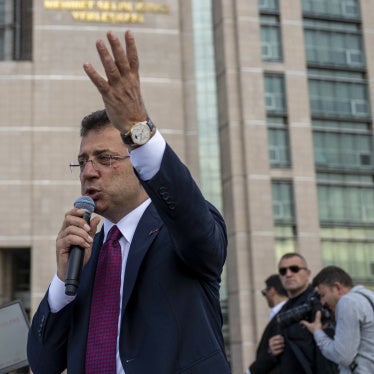Today, Human Rights Watch sent letters to the governments of Sweden and the Netherlands, requesting the withdrawal of their financial support for the OAS Mission supporting the process of demobilization of paramilitary groups in Colombia.
I write to express Human Rights Watch’s grave concerns regarding two related issues. First, we would like to bring to your attention the glaring shortcomings of the Colombian government’s plan for the demobilization of paramilitary groups. And second, we would like to ask the Swedish government to discontinue its contribution to the Organization of American States (OAS) Mission supporting the demobilization process.
As you may know, the Colombian Congress has just passed a law to regulate the demobilization process. Unfortunately, this law is unacceptable in several key areas. It gives extremely generous benefits to members of armed groups at the expense of justice for the victims of serious rights abuses. At the same time, the law fails to establish effective mechanisms to ensure the dismantling of these powerful, mafia-like groups. In particular, the bill contains the following major problems:
- No incentives to confess or disclose information on rights violations: Demobilized members of paramilitary groups receive benefits (greatly reduced sentences) even if they refuse to talk about their criminal activities, or their group’s structure and assets.
- Groups can keep their illegal wealth: The law says members should turn over their illegal assets. But the requirement is toothless: even if members are found to have withheld most of their illegal wealth, they are able to keep their benefits.
- Commanders receive benefits without ensuring their forces’ cessation of abuses: Commanders do not have to ensure their groups’ full demobilization, compliance with the cease-fire, and cessation of criminal activities.
- Investigation and prosecution of abuses is greatly restricted: Prosecutors are required to bring all charges against members within 36 hours of taking their statements, and complete their investigations within the next 60 days. These deadlines are completely unrealistic. Thus, very few members of groups will be charged; even fewer will be tried, and nearly all will escape justice.
- Inadequate sentences for atrocities: Even if there are strong cases against them, members can have their sentences reduced by just “accepting” charges. In practice, total sentences could be lower than two years for even the most serious abuses, and could be served in agricultural colonies, instead of prison.
The serious problems in the law have been noted not only by Colombian and international nongovernmental organizations, but also by international institutions such as the Inter-American Commission on Human Rights. As the Commission pointed out in its December 2004 report on the demobilization process, the government’s demobilization bill “does not refer to acts destined to reveal the truth about the crimes committed … nor the declaration and restitution of the assets acquired as a result of criminal activities. These omissions threaten to deprive victims of the right to judicial protection and adequate reparation….”
Under the newly approved law (which in most respects is the same as the bill criticized by the Commission), the government will give up all its leverage over these groups and their commanders, but will demand virtually nothing in exchange. Members of armed groups can be easily replaced through new recruitment (indeed, paramilitary groups have continued recruiting despite the recent demobilization) and promises of high pay. Even if convicted of atrocities, commanders will be able to serve two years of incarceration and then reenter society with their records clean, and their wealth and criminal networks intact. In short, under this law the demobilization process will seriously damage respect for human rights and efforts to bring justice to Colombia’s victims of abuses, without resulting in real progress towards peace through the dismantlement of paramilitary groups’ structures.
Unfortunately, the OAS Mission, a key international observer to the demobilization process, failed throughout the entire debate over the legal framework to urge any changes to the serious flaws in the bill or to take any other steps to improve the process. Rather than pressing for compliance with international standards, the Mission has supported the process unconditionally, legitimizing the Colombian government’s actions.
Notably, the OAS Mission has not played a significant role in verifying compliance with the cease-fire. As noted by the U.N. High Commissioner for Human Rights during a recent visit to Colombia, paramilitaries have been committing widespread violations of international humanitarian law in breach of the cease-fire, in near-total impunity. Indeed, the Colombian government is completely undermining the credibility of the cease-fire declaration by allowing Diego Murillo (also known as “Don Berna” and “Adolfo Paz”), a notorious paramilitary commander, to demobilize and receive benefits even though he allegedly breached the cease-fire declaration by ordering the assassination of three people, including a Colombian congressman, in April of this year.
We note that, now that the demobilization law has been approved, the Colombian government will probably move quickly to implement the law (even before the Constitutional Court has a chance to review it), granting virtual immunity from prosecution for atrocities and without making genuine progress towards peace.
In this context, the continued presence of the Mission will serve only to enhance the image of the process and to benefit the paramilitaries themselves, signaling the approval of the OAS and the Swedish government for the process. Accordingly, we strongly urge the Swedish government to immediately discontinue its support for the OAS Mission in Colombia.
We value and look forward to continued dialogue with you on these and other important matters.
Sincerely,
/s/
José Miguel Vivanco
cc.: Hans Dahlgren, State Secretary for Foreign Affairs
Olof Skoog, Political Director, Ministry of Foreign Affairs
Per Norström, Director for Latin America, Ministry of Foreign Affairs
Göran Holmqvist, Swedish Development Agency
Ingemar Cederberg, Deputy Ambassador to Colombia






